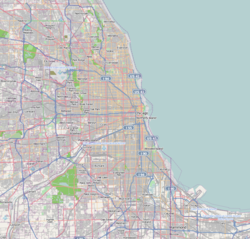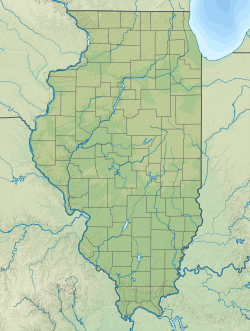Lyons, Illinois
This article needs additional citations for verification. (April 2009) |
Lyons, Illinois | |
|---|---|
 | |
| Motto: Gateway to the West | |
 Location of Lyons in Cook County, Illinois. | |
| Coordinates: 41°48′48″N 87°49′19″W / 41.81333°N 87.82194°W | |
| Country | United States |
| State | Illinois |
| County | Cook |
| Incorporated | 1888 |
| Government | |
| • Mayor | Christopher Getty |
| Area | |
• Total | 2.27 sq mi (5.89 km2) |
| • Land | 2.21 sq mi (5.72 km2) |
| • Water | 0.07 sq mi (0.17 km2) |
| Elevation | 620 ft (190 m) |
| Population (2020) | |
• Total | 10,817 |
| • Density | 4,901.22/sq mi (1,891.99/km2) |
| Time zone | UTC-6 (CST) |
| • Summer (DST) | UTC-5 (CDT) |
| ZIP Code(s) | 60534 |
| Area code | 708 |
| FIPS code | 17-45434 |
| Wikimedia Commons | Lyons, Illinois |
| Website | www |
Lyons is a village in Cook County, Illinois, United States. Per the 2020 census, the population was 10,817.[2] The Chicago Portage National Historic Site is located in Lyons.
History
[edit]Lyons was incorporated in 1888,[3][4] though activity in the area dates back much further. In 1673 French Explorer Louis Joliet and Jesuit missionary Father Pierre Marquette left Green Bay, Wisconsin, by canoe in search of a western passage to the Pacific. As they traveled into the Spanish-controlled area of Louisiana, they realized that the mighty Mississippi River drained into the already well-known Gulf of Mexico. With winter approaching, they headed north as quickly as possible. To save time, the Potawatomi who were with them were encouraged to change their route to the Illinois River. The shortcut led to the Des Plaines River and caused the French travelers to discover “Le Portage.” This half-mile wide area of land connecting the Chicago River and the Des Plaines River, over which they could carry their canoes and supplies, was to become the discovery for which they would both become famous. Later known as the Chicago Portage, this small area became the “Gateway to the West” and was used by thousands of early settlers and traders traveling both east and west. The discovery of “Le Portage” was part of the impetus that led to Chicago becoming a center for world trade.
Louis Joliet was the first to propose a canal between the two waterways, which would be constructed around 200 years later in 1848 with the construction of the Illinois and Michigan Canal. In time, the part of the I&M Canal that connected the south branch of the Chicago River with the Des Plaines River was replaced with the Chicago Sanitary and Ship Canal, which was completed in 1900. Today, a statue stands in Lyons at the Chicago Portage National Historic Sight just north of Interstate 55 along Harlem Avenue, commemorating this historic National Heritage Corridor which stretches southwest through La Salle, Illinois.[5]
From the early 1960s through the late 1980s, Lyons was known for its notorious links to organized crime. Mayor William Smith, for whom a park was named, was being subjected to a federal corruption investigation when he died from cancer in 1989. During the 1970s and 1980s, the small town was littered with strip clubs and bars along its Ogden Avenue corridor. It was often referred to an area of east Ogden Avenue known as "Driftland", due to the amount of drifters in the area. However, the village changed dramatically in the 1990s, and none of the strip clubs and most licensed bars no longer exist. Lyons continues to thrive and attract businesses and new residents. It is now a quiet residential suburb supported by several grammar schools, a middle school, and a well-maintained park district.
Lyons is a working-class area, though much of the nearby manufacturing work has dried up (e.g., Electro-Motive & Reynolds Aluminum) small specialty businesses have emerged. The city has historically been home to a large Polish American community since the turn of the 20th century, which is reflected in three of the town's street names: Pulaski after Revolutionary War hero Casimir Pulaski as well as Warsaw and Kraków. Lyons is the subject of a recently published book by Mark Athitakis, a native of Lyons, detailing the town's rich and colorful history.
Geography
[edit]Lyons is located at 41°48′48″N 87°49′19″W / 41.81333°N 87.82194°W (41.813258, -87.821812).[6]
According to the 2021 census gazetteer files, Lyons has a total area of 2.27 square miles (5.88 km2), of which 2.21 square miles (5.72 km2) (or 97.05%) is land and 0.07 square miles (0.18 km2) (or 2.95%) is water.[7]
Demographics
[edit]| Census | Pop. | Note | %± |
|---|---|---|---|
| 1880 | 486 | — | |
| 1890 | 732 | 50.6% | |
| 1900 | 951 | 29.9% | |
| 1910 | 1,483 | 55.9% | |
| 1920 | 2,564 | 72.9% | |
| 1930 | 4,787 | 86.7% | |
| 1940 | 4,960 | 3.6% | |
| 1950 | 6,120 | 23.4% | |
| 1960 | 9,936 | 62.4% | |
| 1970 | 11,124 | 12.0% | |
| 1980 | 9,925 | −10.8% | |
| 1990 | 9,828 | −1.0% | |
| 2000 | 10,255 | 4.3% | |
| 2010 | 10,729 | 4.6% | |
| 2020 | 10,817 | 0.8% | |
| U.S. Decennial Census[8] 2010[9] 2020[10] | |||
As of the 2020 census[11] there were 10,817 people, 3,651 households, and 2,333 families residing in the village. The population density was 4,756.82 inhabitants per square mile (1,836.62/km2). There were 4,415 housing units at an average density of 1,941.51 per square mile (749.62/km2). The racial makeup of the village was 50.31% White, 4.57% African American, 1.53% Native American, 1.72% Asian, 0.06% Pacific Islander, 22.77% from other races, and 19.03% from two or more races. Hispanic or Latino of any race were 49.81% of the population.
There were 3,651 households, out of which 35.6% had children under the age of 18 living with them, 44.29% were married couples living together, 12.08% had a female householder with no husband present, and 36.10% were non-families. 32.79% of all households were made up of individuals, and 15.04% had someone living alone who was 65 years of age or older. The average household size was 3.66 and the average family size was 2.82.
The village's age distribution consisted of 24.7% under the age of 18, 7.1% from 18 to 24, 30% from 25 to 44, 22.4% from 45 to 64, and 15.7% who were 65 years of age or older. The median age was 36.4 years. For every 100 females, there were 95.9 males. For every 100 females age 18 and over, there were 92.4 males.
The median income for a household in the village was $66,005, and the median income for a family was $76,892. Males had a median income of $40,936 versus $33,315 for females. The per capita income for the village was $28,221. About 6.9% of families and 9.3% of the population were below the poverty line, including 10.0% of those under age 18 and 10.5% of those age 65 or over.
| Race / Ethnicity (NH = Non-Hispanic) | Pop 2000[12] | Pop 2010[9] | Pop 2020[10] | % 2000 | % 2010 | % 2020 |
|---|---|---|---|---|---|---|
| White alone (NH) | 8,079 | 5,889 | 4,458 | 78.78% | 54.89% | 41.21% |
| Black or African American alone (NH) | 98 | 419 | 464 | 0.96% | 3.91% | 4.29% |
| Native American or Alaska Native alone (NH) | 12 | 16 | 15 | 0.12% | 0.15% | 0.14% |
| Asian alone (NH) | 143 | 143 | 179 | 1.39% | 1.33% | 1.65% |
| Pacific Islander alone (NH) | 4 | 1 | 1 | 0.04% | 0.01% | 0.01% |
| Other race alone (NH) | 9 | 25 | 43 | 0.09% | 0.23% | 0.40% |
| Mixed race or Multiracial (NH) | 242 | 123 | 269 | 2.36% | 1.15% | 2.49% |
| Hispanic or Latino (any race) | 1,668 | 4,113 | 5,388 | 16.27% | 38.34% | 49.81% |
| Total | 10,255 | 10,729 | 10,817 | 100.00% | 100.00% | 100.00% |
Government
[edit]This section needs additional citations for verification. (April 2009) |
Lyons is in Illinois's 3rd congressional district.[citation needed]
The United States Postal Service operates the Lyons Post Office at 7836 Ogden Avenue. [13]
Transportation
[edit]Pace provides bus service on multiple routes connecting Lyons to destinations across the region.[14]
Education
[edit]Lyons is served by the Lyons Elementary School District 103, which operates 5 elementary schools, two of which are in Lyons (Costello, and Robinson Elementary Schools). The other 3 schools are Home, Edison (Both in Stickney), and Lincoln, which is in Brookfield. Middle school students attend George Washington Middle School.
High school students from Lyons attend J. Sterling Morton West High School, located in Berwyn.[15]
Lyons operates the Lyons Public Library at 4209 Joliet Avenue.[16]
References
[edit]- ^ "2020 U.S. Gazetteer Files". United States Census Bureau. Retrieved March 15, 2022.
- ^ "Lyons village, Illinois". United States Census Bureau. Retrieved April 15, 2022.
- ^ "Illinois Counties and Incorporated Municipalities" (PDF). Illinois Secretary of State. July 2012. p. 16. Retrieved September 26, 2019.
- ^ "Lyons History". Village of Lyons. Retrieved September 26, 2019.
- ^ "Lyons History". Village of Lyons. Retrieved January 7, 2024.
- ^ "US Gazetteer files: 2010, 2000, and 1990". United States Census Bureau. February 12, 2011. Retrieved April 23, 2011.
- ^ Bureau, US Census. "Gazetteer Files". Census.gov. Retrieved June 29, 2022.
{{cite web}}:|last=has generic name (help) - ^ "Decennial Census of Population and Housing by Decades". US Census Bureau.
- ^ a b "P2 Hispanic or Latino, and Not Hispanic or Latino by Race – 2010: DEC Redistricting Data (PL 94-171) – Lyons village, Illinois". United States Census Bureau.
- ^ a b "P2 Hispanic or Latino, and Not Hispanic or Latino by Race – 2020: DEC Redistricting Data (PL 94-171) – Lyons village, Illinois". United States Census Bureau.
- ^ "Explore Census Data". data.census.gov. Retrieved June 28, 2022.
- ^ "P004: Hispanic or Latino, and Not Hispanic or Latino by Race – 2000: DEC Summary File 1 – Lyons village, Illinois". United States Census Bureau.
- ^ "USPS Locations - Lyons Post Office". Retrieved September 19, 2016.
- ^ "RTA System Map" (PDF). Retrieved January 31, 2024.
- ^ "Morton District 201 Sees a High Percentage of College Enrollment Among 2016 Graduates", Chicago Tribune, June 9, 2017. Retrieved July 5, 2017.
- ^ Home page." Lyons Public Library. Retrieved on April 17, 2009.





